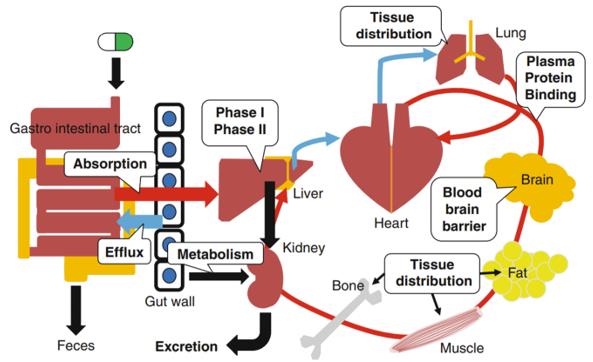In Vitro Metabolism Studies
The study of in vitro metabolism can help guide the synthesis optimization of lead compounds or drug candidates to overcome drug stability and toxicity issues. Our company has extensive expertise in pharmacokinetics, particularly in vitro metabolism, our professional team can provide multiple advantages, including customization and confidentiality to accelerate your development of rare disease therapy.
In Vitro Metabolism of Drugs
When a drug undergoes enzymatic biotransformation in living systems, its biological activity is affected, sometimes producing metabolites with reduced bioavailability and increased toxicity. Therefore, more and more pharmaceutical companies are incorporating in vitro absorption, distribution, metabolism, and excretion (ADME) methods into drug development. In vitro metabolism studies are an inexpensive and easy-to-perform screening mechanism to characterize drug metabolites, elucidate their pathways, and provide guidance for further in vivo testing.
Methods for the study of in vitro metabolism are increasingly coupled with high-throughput automation and analysis. Various new technologies and in vitro models are also widely used in in vitro metabolism studies:
- Subcellular fractions have been widely used in vitro metabolism studies.
- As the reproducibility of cell isolation has improved, isolated hepatocytes have become the most powerful model.
- The application of cDNA expression enzymes is becoming more and more mature.
- As slicing technology matures, liver slices are increasingly common in in vitro metabolism studies.
- More and more in vitro models, including non-hepatic microsomes, are widely used.

Fig.1 Schematic diagram of ADME for oral administration of drugs. (Shin, H K., et al., 2017)
Approaches from in vitro metabolism studies are being applied to drug candidates in earlier stages of rare disease development because they are critical for identifying compounds that may pose ADME challenges in later stages of rare disease drug development.
What Services Can We Provide?
Our company's professional team performs various ADME studies to satisfy the unique requirements of our clients. The in vitro metabolism studies services we can provide include but are not limited to:
-
Cytochrome P450 Studies
- CYP450 inhibition and time-dependent inhibition
- CYP450 reaction phenotyping
- CYP450 induction
-
Protein Binding Studies
- Plasma protein binding (ultra-filtration and equilibrium dialysis)
- Microsomal protein binding
- Tissue protein binding
-
Stability Studies
- Metabolic stability using liver microsomes / hepatocytes / rCYPs / S-9 fraction
- Matrix stability in tissue, plasma, SGF/SIF, etc.
-
Metabolite ID/Profiling
- Identification of microsomes
- Identification of S9
- Identification of hepatocytes
Project Workflow

Our company offers comprehensive services and technical support covering every stage of drug discovery and research, designed to help our clients address possible barriers and challenges in the studies of in vitro metabolism for rare diseases. If you are interested in our service, please contact us and we will be happy to work with you to customize your project solutions.
Reference
- Shin, H K., et al., "Predicting ADME properties of chemicals." Handbook of computational chemistry 59 (2017): 2265-2301.
All of our services and products are intended for preclinical research use only and cannot be used to diagnose, treat or manage patients.
